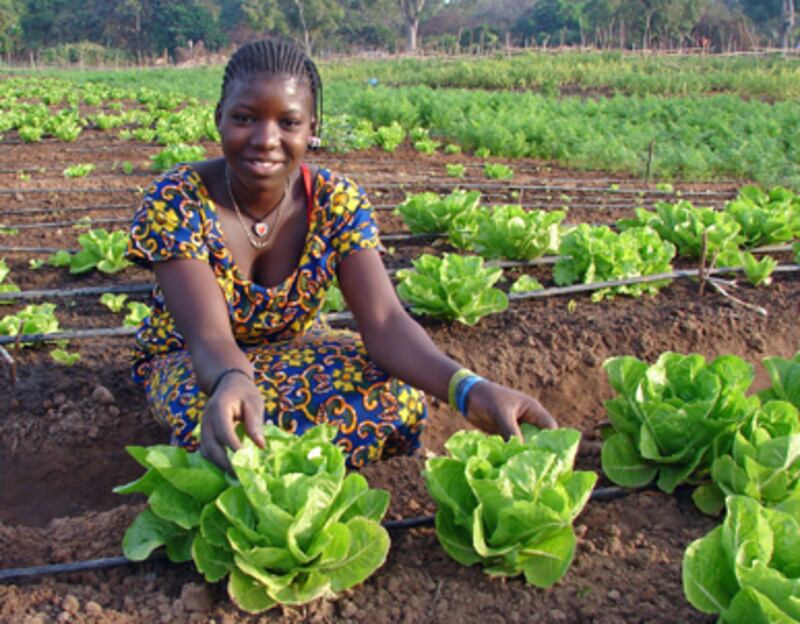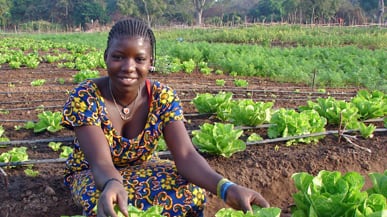Leticia Brenyah teaches mathematics and communications technology to high school students in Takoradi, Ghana, a coastal town 125 miles from the capital Accra. To her students, she’s known as “Madame Technology.” But to 250,000 female farmers across the country, she’s known as a powerful change agent. Brenyah is the coordinator of PALMS, a nonprofit organization that trains female farmers in Ghana to use sustainable practices and up-to-date technology to improve crop yields, production and distribution systems.
Her father Joseph created Productive Agricultural Linkages and Marketing Systems in 2005. The concept is simple: Teach women farmers to use basic machinery, like tractors, and crop production will increase. But the effects of the implementation of such technology are revolutionary. The women helped through PALMS have access to knowledge, capital, and technology that allows them to assert power within their families, their communities, and improve the economy of the entire country.
“When I was younger, my mom used to cook with charcoal in a coal pot. It took her four to five hours to cool a simple meal,” Brenyah, 28, explained on stage during a panel on women’s economic empowerment during the Clinton Global Initiative on Tuesday. “Now with a gas stove, I’m able to do in 45 minutes what took her hours. When you introduce women to technology, you give them time to do other things.”
Nearly 60 percent of Ghana’s 23 million residents are farmers and agriculture accounts for a third of the country’s GDP, yet two-thirds of the predominantly small-scale farms use outdated or environmentally dangerous methods of crop production. Weeding is done by hand. Chemicals and pesticides are used with abandon, sometimes leading to uncultivable soil. Irrigation systems are outmoded and ineffective.
• Full Coverage: Clinton Global InitiativeWith 10 full-time staffers and an untold number of volunteers (“As we train the women in the villages, they train other women. You lose count of them,” Brenyah tells The Daily Beast), PALMS has helped 250,000 women farmers in five of the 10 regions of Ghana. The program, backed in part by ExxonMobil, teaches women to drive tractors, operate grass cutters, build solar-powered irrigation systems, and extract biodiesel from the Moringa plant. The new knowledge affords them more time and more power within patriarchal family structures. In the case of one woman Brenyah mentioned, the efficiency of a new irrigation system gave the mother free time to walk her kids to school. For another, her mastery of machinery and greater participation in the family’s business encouraged her husband to start asking her opinion in family matters. “If a women helps to earn the household’s money, then she doesn’t have to depend on her husband,” says Brenyah, “and she will have a say in what the money is used for.”
“When you introduce women to technology, you give them time to do other things.”

PALMS also works with rural banks to provide credit to groups of women to purchase machinery for the farms. The banks have been reluctant to extend credit to women because their farms are often in the name of their husbands or the patriarchs of their extended families. The program also encourages women to get their names on the deeds of family farms, so that death or divorce will not threaten their livelihood.
“Providing women with property rights makes economic sense,” said Tim Hanstad, president and CEO of Rural Development Institute during Tuesday’s panel. “When women have control over land, they invest more in the household and in their children… and they are more empowered in their household.”
In the next five years, PALMS would like to help an additional 250,000 female farmers. Brenyah expects that to be feasible thanks to a grant from ExxonMobil, which announced a commitment of $1 million to the five winning innovators chosen from among 270 entrants.
Challenging the societal norms is something that Brenyah takes personally. Though she speaks softly, with a deliberate cadence and obvious humility, when she talks of her own experience, her voice rises and her hands animate. “When I was growing up, I chose to study science and everyone was against me,” she says. “We are so used to the way we do things. But if one person does something first, then others will follow.”
Lauren Streib is a reporter for The Daily Beast. She was previously a reporter for Forbes.






